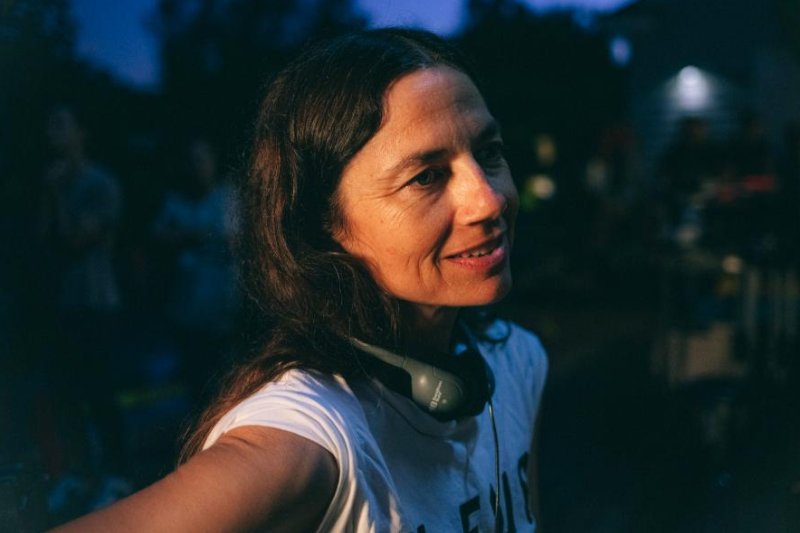1 of 5 | Justine Bateman on the set of her new film, "Violet." Photo courtesy of Relativity Media
NEW YORK, Oct. 26 (UPI) -- Family Ties and Satisfaction icon Justine Bateman says she wrote and directed Violet, a beautiful and powerful depiction of an accomplished female movie producer's crippling insecurity, because it is the kind of film she would have found inspiring when she was younger.
"Years ago, I made a lot of fear-based decisions, and I didn't feel myself and didn't know that I could come away from that and be an instinct-based person like so many of the people that I admired," Bateman told UPI in a recent Zoom interview.
"I felt like a lot of time had been stolen from me," she added. "I wrote this script as an effort to help others. It's the film I wish I'd seen at 19."
Violet opens in theaters Friday and will become available on pay-per-view platforms Nov. 9. It stars Olivia Munn from The Newsroom as the title character and Luke Bracey from Little Fires Everywhere as her best friend and roommate, the kind and laid-back Red.
Playing the nasty voice in Violet's head that constantly makes her second-guess herself is Justin Theroux from The Leftovers. The cast also includes Bonnie Bedelia, Laura San Giacomo, Jason Dohring, Zachary Gordon, Rain Phoenix and Colleen Camp.
"It's really about the human condition," Bateman said about the film, which follows one woman's journey to discovering and embracing her authentic self. "The lead character could have been a man, and the voice would have been saying something different."
In addition to showing how Violet reacts to circumstances and hearing her innermost thoughts, Bateman also frequently scrawls words across the screen to emphasize the stress her protagonist is under.
Much of Theroux's voice part and the writing on the screen were added during the editing process to create a more visceral experience for viewers, meaning Munn relied heavily on the script and Bateman's direction to get into Violet's headspace.
"Olivia and I talked a lot and worked great together, and she really gave herself to the part and it, obviously, paid off tremendously," Bateman said.
"To have Olivia's performance, and then the voice press down twice as often on her in the film, and then have the handwriting bubbling up from underneath created this pressure cooker."
Munn said she had no idea what the finished film would look like when all of these elements were blended together but trusted Bateman had a specific vision to tell this story.
"When I watched it, I knew that it was going to be something that I hadn't seen before and couldn't have predicted while filming it," Munn said.
"But, while filming, I did feel the pressure cooker a lot. I have, myself, tried very hard to quiet that voice in my own head, so then to do this film, I had to open that door back up and let that voice come back in, so it was a big emotional undertaking."
Bracey relates to Red because he, too, tries to follow his instincts and focus his energy on the positive aspects of life and himself.
"He is a very liberating guy to think about and explore," Bracey said, adding he loved how Bateman gave him and Olivia space to figure out what their characters meant to each other.
"It was all about finding the most human and connected bits," the actor said, adding it was important for Red to demonstrate by example to Violet that there is another way to live.
"Not tell her. But be a good friend and just open a window and go, 'Look what's out here, Violet.' He's a fun, supportive person and someone who ultimately is doing this for someone he cares about, so she can have a fulfilled life she deserves and she is going to own herself."
Munn describes Red as a life raft for Violet.
"But the life raft is still in the middle of the ocean, and she's got to do her part to swim toward it. Luke plays it so beautifully, and there is so much light to him, which is a difficult thing to do to have that lightness and airiness," Munn explained.
Red cares deeply for Violet and sees how she is struggling, but knows her well enough to accept there was only so much he could do for her until she was ready to receive love and value herself, the actress noted.
"A big part of surviving is saving yourself," she said.
The movie was supposed to come out in March 2020, just as the coronavirus pandemic hit, and was not designed to be a post-lockdown story. However, viewers seeing it now might connect in new ways to a tale about anxiety, self-love and reinvention, Bateman acknowledged.
"I think this film would have resonated 10 years ago and will resonate 10 or 20 or 50 years from now," Bateman said. "As a filmmaker, I always hope I am making films that are relevant to the viewers who aren't even born yet."
Munn agreed Violet is a timeless tale.
"There are so many people who have those insidious thoughts that force us to make these fear-based decisions, and there is a nice feeling of community in that," Munn said.
"To hear so many people connect with [the film], whether it is because of what we went through as a world -- or because it is something we've always been going through -- has been really special to me. It's a nice feeling to know you are not alone in this."















